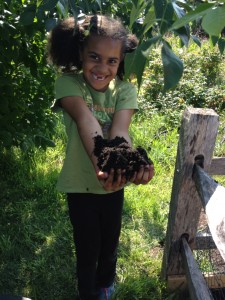Some folks LOVE GOOEY and others HATE GOOEY. I have a colleague who confessed that she wretches just looking at a worm. 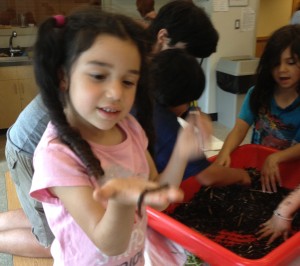 And yet the children at our community garden love worms. They search for them, hold them, stroke them and carry them around. A little girl placed several on her arm and tilted her head to balance a wriggler on her cheek!
And yet the children at our community garden love worms. They search for them, hold them, stroke them and carry them around. A little girl placed several on her arm and tilted her head to balance a wriggler on her cheek!
What draws some people to the dirt and gardening while others hate to get dirty? Many are perfectly happy to buy produce at the market. In fact, some folks can’t stand getting messy-ever.
Our touch system has two very important roles, both critical to our safety and developing skills leading to success in life.
The Protective aspect of touch goes way back to our ancestors (as in animals). If something touched you in the jungle and you didn’t know what it was (likely a predator) the body would react with a Fright Flight Fight Response. Adrenaline, stress hormones and muscle readiness for action would occur.
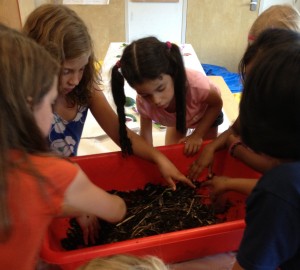 Happily, most of us no longer live in primitive settings and we generally are not faced with life and death situations. However, if a strange sound wakes you at night, you probably experience a similar response. It takes a while to calm down (heart rate returning to normal and muscles relaxing).
Happily, most of us no longer live in primitive settings and we generally are not faced with life and death situations. However, if a strange sound wakes you at night, you probably experience a similar response. It takes a while to calm down (heart rate returning to normal and muscles relaxing).
This extreme response is frequently experienced when a person’s touch system is out of balance and the Protective system dominates. They may be uncomfortable getting dirty, fussy about the clothes they wear and cringe at unfamiliar textures.
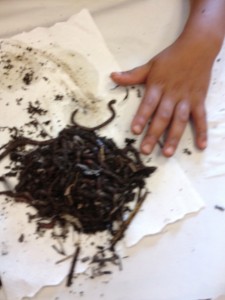 The other major function of a touch sense is discrimination. As we feel objects and things in the environment our minds are constantly absorbing this information. The shape of an object, the texture, temperature and much more are registered. Touch discrimination provides a strong base for later learning. For example:
The other major function of a touch sense is discrimination. As we feel objects and things in the environment our minds are constantly absorbing this information. The shape of an object, the texture, temperature and much more are registered. Touch discrimination provides a strong base for later learning. For example:
- Feel a round ball→Circle
- Bang into a sharp Corner→90 degree angle
We need both to explore and learn in our world. Looking with touching is a more powerful way to experience and learn about a concept.
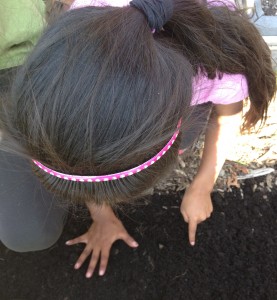 When children struggle with touch, they tend to avoid exploring the world with their hands. Fortunately, the touch system is flexible and can change. In essence, if a child avoids touch exploration, engaging in multi-sensory activities helps to develop a tolerance of tactile stimuli. Eventually the balance between protective touch and touch discrimination improves.
When children struggle with touch, they tend to avoid exploring the world with their hands. Fortunately, the touch system is flexible and can change. In essence, if a child avoids touch exploration, engaging in multi-sensory activities helps to develop a tolerance of tactile stimuli. Eventually the balance between protective touch and touch discrimination improves.
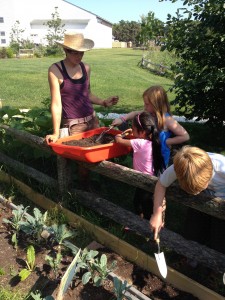 In our gardening, we have emphasized all the great benefits of digging (eye hand, bilateral, core strength) and planting seeds (fine motor, visual perception). Another huge benefit to gardening is the opportunity to immerse oneself in a tactile extravaganza.
In our gardening, we have emphasized all the great benefits of digging (eye hand, bilateral, core strength) and planting seeds (fine motor, visual perception). Another huge benefit to gardening is the opportunity to immerse oneself in a tactile extravaganza.
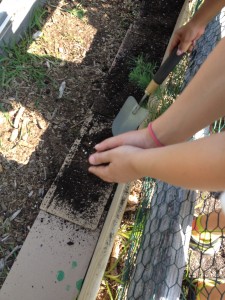 There are tools and garden gloves, so the touch sensitive individual can get started tentatively. For many of our kids, they toss the tools and dig in with their hands.
There are tools and garden gloves, so the touch sensitive individual can get started tentatively. For many of our kids, they toss the tools and dig in with their hands.
For more about the Touch System, visit Sensory Processing. This section will explains how all of our senses influence our emotions, behavior, attention and learning.
This post reflects the partnership and creative collaboration between The Motor Story, Sustainable CAPE , Truro Public Library and Truro Recreation.
